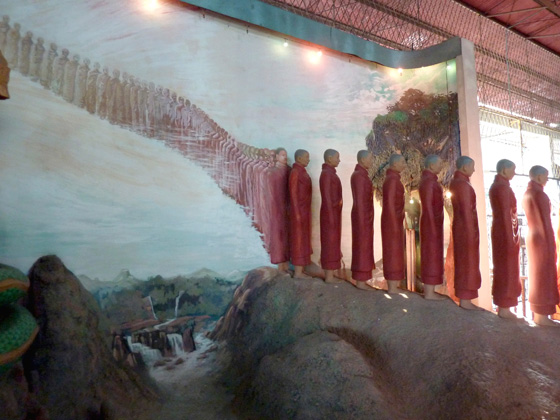The study of religion has always intrigued scholars, philosophers, and the general populace. It embodies an inquiry into the spiritual dimensions of human existence, encapsulating a rich tapestry of beliefs, practices, and experiences. Within this ambit lies the Bahá’í perspective, which elucidates the paradox of religious decline juxtaposed against the eternal essence of faith. Bahá’í teachings provide profound insights into why religions may experience periods of decline, yet simultaneously assert their enduring nature. This exploration will delve into several themes, including the cyclical nature of religions, the impact of societal evolution, and the instrumental role that spirituality plays in the human experience.
At the core of Bahá’í teachings is the notion that religious truth is not static; rather, it is dynamic and evolves over time. This evolution is often manifested through a cyclical pattern characterized by emergence, growth, maturity, decline, and eventual renewal. Various historical religions have illustrated this phenomenon. For instance, consider how the early fervor of Christianity gave way to dogmatic rigidity and institutional decline. Similarly, Hinduism experienced transformative phases, where initial vigor diminished into sectarian divisions. The cyclical nature of religions, as elucidated by Bahá’í teachings, suggests that each decline harbors the potential for rejuvenation, thereby integrating the notion of eternal life within the religious context.
Another significant factor influencing religious decline is the societal transformation that engenders new ideologies and worldviews. The Bahá’í perspective posits that as communities evolve, so too must their spiritual frameworks. The rise of scientific rationalism during the Enlightenment, for example, prompted a reevaluation of traditional religious dogmas, leading to a decline in the authority of established religions. This decline does not spell the end of religion per se; rather, it underscores a pivotal transition in which spiritual seekers gravitate towards more universal principles. Bahá’í teachings advocate for the unification of humanity regardless of religious affiliations, promoting a synthesis of insights derived from diverse faith traditions. Such a synthesis embodies the essence of eternal teachings, as it seeks to transcend cultural and ideological barriers.
The phenomenon of religious decline often engenders a disillusionment with established institutions, prompting individuals to search for spirituality outside conventional religious paradigms. In contemporary society, there is an observable trend towards the exploration of spirituality in a more personalized form. Many individuals now embrace ecumenical or syncretic approaches to religion, drawing from multiple traditions. Changes in how spirituality is perceived necessitate a reexamination of why religions decline. Bahá’í teachings affirm that the dilution of traditional structures, while seemingly detrimental, can facilitate an awakening of spiritual consciousness. It fosters an environment in which individuals can form direct relationships with the divine, independent of intermediaries, thereby enriching their spiritual journeys.
Furthermore, the principles of unity and diversity espoused by Bahá’í teachings serve as a lens through which we can comprehend the perennial relevance of faith. The decline of a singular religious institution often coincides with a broader quest for spiritual unity among diverse populations. As humanity faces unprecedented challenges, such as climate change and geopolitical conflicts, the need for common ground becomes evident. Bahá’í teachings emphasize the oneness of humanity and advocate for collective action—a phenomenon that can revitalize spiritual engagement across different cultures and faiths. By emphasizing the common elements of ethics and values, adherents can glean insights that transcend individual religious traditions, fostering a more holistic understanding of spirituality.
Another pivotal theme in the enduring nature of religions is the capacity for re-interpretation and renewal. Bahá’í teachings underscore the importance of adapting spiritual practices to resonate with contemporary experiences. The decline of religions often stems from rigid interpretations that fail to resonate with modern realities. Yet, religions capable of engaging in critical reflection can reinvent themselves. For example, the adaptation of traditional rituals and teachings to align with contemporary social justice movements provides a rejuvenated sense of purpose. In this way, religious traditions are not merely relics of the past; they are living philosophies that can respond to the exigencies of the times, ensuring their continuity.
In the face of challenges and changes, the assertion of the eternal nature of religious truths hinges upon their universality and applicability to the human condition. Bahá’í teachings herald the concept of progressive revelation, wherein spiritual truths are gradually unveiled to humanity in accordance with its evolving capacities. This tenet essentially posits that religions are not mutually exclusive but rather are building blocks towards a greater understanding of divinity. Each religion contributes its unique insights to the collective spiritual heritage of humanity, facilitating an ecumenical dialogue that underscores our shared quest for meaning.
Thus, the Bahá’í perspective offers profound reflections on the dichotomy of religious decline and the eternal truths that underpin human spirituality. It teaches that through the cyclical emergence and decline of religions lies an inherent resiliency—one that not only survives but thrives amidst the complexities of human existence. The decline of a religion may serve as a catalyst for profound spiritual inquiry, leading individuals toward a deeper quest for understanding that is inclusive, adaptable, and ultimately transformative. As humanity navigates the complexities of modern life, the wisdom embedded in religious teachings—particularly those articulated within the Bahá’í faith—provides a steadfast beacon, illuminating the path toward spiritual unity in a divided world. This eternal mission of faith thus resonates with a timeless relevance, reflecting the quintessential longing for connection, meaning, and transcendence shared across the human experience.
